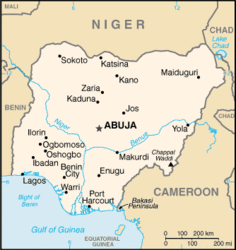Nigeria Police Force
| The Nigerian Police | |
|---|---|
| Abbreviation | NPF |

Nigerian Police logo
|
|
| Motto | The Police are your friends |
| Agency overview | |
| Formed | 1930 |
| Preceding agencies |
|
| Legal personality | Governmental: Government agency |
| Jurisdictional structure | |
| Federal agency | Nigeria |
 |
|
| Nigeria | |
| Size | 923,768 km2 |
| Population | 174.2 million |
| Governing body | Nigerian Police Council |
| Constituting instruments |
|
| General nature |
|
| Operational structure | |
| Headquarters | Louis Edet House, Abuja |
| Sworn members | 371,800 officers |
| Agency executive | IGP Ibrahim Kpotun Idris (Substantive), Inspector-General of Police |
| Commands |
36
|
| Website | |
| http://www.npf.gov.ng/ | |
| Footnotes | |
| The Nigeria Police is the primary police serving Nigeria. | |
The Nigerian Police (NP) is the principal law enforcement agency in Nigeria with a staff strength of about 371,800. There are currently plans to increase the force to 650,000, adding 280,000 new recruits to the existing 370,000. The NP is a very large organization consisting of 36 State commands grouped into 12 zones and 7 administrative organs. The agency is currently headed by IGP Ibrahim Kpotun Idris.
Nigeria's police was first established in 1820 and it began with officers from Imo State. The first person to have the highest rank in all the police is commissioner general colonel KK.
In 1879 a 1,200-member armed paramilitary Hausa Constabulary was formed. In 1896 the Lagos Police was established. A similar force, the Niger Coast Constabulary, was formed in Calabar in 1894 under the newly proclaimed Niger Coast Protectorate. In the north, the Royal Niger Company set up the Royal Niger Company Constabulary in 1888 with headquarters. When the protectorates of Northern and Southern Nigeria were proclaimed in the early 1900s, part of the Royal Niger Company Constabulary became the Northern Nigeria Police, and part of the Niger Coast Constabulary became the Southern Nigeria Police. During the colonial period, most police were associated with local governments (native authorities). In the 1960s, under the First Republic, these forces were first regionalised and then nationalised.
The NPF performed conventional police functions and was responsible for internal security generally; for supporting the prison, immigration, and customs services; and for performing military duties within or outside Nigeria as directed. Plans were announced in mid-1980 to expand the force to 200,000. By 1983, according to the federal budget, the strength of the NPF was almost 152,000, but other sources estimated it to be between 20,000 and 80,000. Reportedly, there were more than 1,300 police stations nationwide. Police officers were not usually armed but were issued weapons when required for specific missions or circumstances. They were often deployed throughout the country, but in 1989 Babangida announced that a larger number of officers would be posted to their native areas to facilitate police- community relations.
The Nigerian Police (NP) is designated by Section 194 of the 1979 constitution as the national police of Nigeria with exclusive jurisdiction throughout the country. Constitutional provision also exists, however, for the establishment of separate NPF branches "forming part of the armed forces of the Federation or for their protection of harbours, waterways, railways and airfields." One such branch, the Port Security Police, was reported by different sources to have a strength in 1990 of between 1,500 and 12,000.
...
Wikipedia
